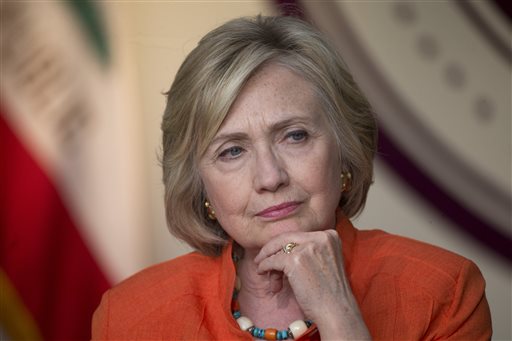Clinton campaign looks to future on coal policy
August 10, 2015 by Ken Ward Jr.
In this Thursday, Aug. 6, 2015, file photo, Democratic presidential candidate Hillary Rodham Clinton listens to a home care worker during a roundtable discussion in Los Angeles. (AP Photo/Jae C. Hong, File)
Over the weekend, Reuters picked up on a story that we covered her late last month on Coal Tattoo, regarding Democratic presidential candidate Hillary Clinton’s position on coal-mining issues. Their story started out:
In her 2008 bid for the White House, Hillary Clinton cast herself as a blue-collar Democrat who was unabashedly pro-coal, a stance that helped her beat opponent Barack Obama easily in primaries in states that produced or were reliant on coal.
Eight years later, a Reuters review of her recent campaign speeches and policy announcements shows that the great-granddaughter of a Welsh coal miner is now talking about the coal industry in the past tense.
The little-noticed shift in rhetoric speaks volumes about how the United States’ energy landscape has changed since Clinton last campaigned in 2008: oil and gas fracking have exploded and cheap natural gas has taken a huge bite out of coal.
In the intervening years the Obama administration has also proposed aggressive measures to tamp down greenhouse gas emissions from fossil fuels like coal, while once-powerful coal companies like Arch Coal, which declared bankruptcy last week, have lost their political clout.
The shift by Clinton is not without significant political risk. She will have to walk a fine line in trying to please the progressive activists she needs to win her party’s nomination and working-class “swing” voters whose support will be crucial for the general election in November 2016. Ohio and Pennsylvania, in particular, have a lot of electoral votes, which are key to electing a new president.
Mindful of that, Clinton has been careful to pay tribute to the contribution coal miners have made to the American economy, but she has also made clear that they should be helped to find new jobs, and a new way of life.
Ed Rendell, former Democratic governor of Pennsylvania and Clinton ally, said an economic case for addressing climate change could resonate in his state, where the coal industry employs more than 36,000 directly and indirectly, according to the Pennsylvania Coal Alliance.
“Citizens, coal miners and executives are not dumb and they see the handwriting on the wall. Someone needs to tell them the truth and make it clear,” he said in an interview.
The next sentence seemed familiar:
Clinton’s campaign declined to comment on the shift in her coal message or how she plans to appease both environmentalists and coal workers.
When I wrote about Clinton’s position on coal, based on what little information was in a summary of her climate change plan, I tried to find our more. A regional press aide sent me this:
On background, just wanted to make sure you saw – as the fact sheet lays out – there are more details including on coal communities that are forthcoming. Below are some recent comments she’s made about Coal:
Clinton: “I’m Not Going To Be Ruing The Fact That We Still Have People In The Coal Industry As We Move Toward A Clean Energy Future.” “So I’m not going to be pointing fingers. I’m not going to be ruing the fact that we still have people in the coal industry as we move toward a clean energy future.” [Glen, NH Organizing Event, 7/4/15]
Clinton: “I Want Our Country To Invest In Coal Country.” “But I am going to say, I want you to be part of the future, not part of the past. I want our country to invest in coal country.” [Glen, NH Organizing Event, 7/4/15]
Clinton: People Who Live In Coal Country “Deserve Better” “If you’ve been there, you’ve seen the ravages, you’ve seen the distressed communities. You’ve seen the strip mining and the mountaintop, you know, destruction. You’ve seen it. The people living there deserve better. They deserve better from their politicians. They deserve better from their government. They deserve better from all of us.” [Glen, NH Organizing Event, 7/4/15]
Clinton: “I For One Am Grateful For Everybody Who Ever Mined Coal For The United States.” “Now, I for one am grateful for everybody who ever mined coal for the United States. Because that turned on the lights and fueled are factories and gave us the economic advantage in the 19th and 20th century to really develop our own economy.” [Glen, NH Organizing Event, 7/4/15]
I followed up with specific questions:
— Does Mrs. Clinton support the specific provisions included in the Obama administration’s “Power Plus Plan” for aid to coalfield communities, including the pension language and the budget proposals for more spending on economic programs here?
— If not, what specific proposals does she have for helping communities suffering economic loss as coal jobs disappear?
— What, if any, specific program does Mrs. Clinton propose for doing more research for development and deployment of carbon capture and sequestration?
— Given Mrs. Clinton’s announcement of her goals for clean energy, what role does she see remaining for coal — and also for natural gas?
The campaign never responded.
For the record, the summary of her climate change plan had this to say about coalfield communities:
Coal Communities: Protect the health and retirement security of coalfield workers and their families and provide economic opportunities for those that kept the lights on and factories running for more than a century.
It’s all well and good for the Clinton campaign to — as Gov. Rendell put it — say they’re going to tell coalfield residents, miners and others “the truth” about coal. But to do that, the campaign will have to, you know, talk about the issue. Answering some pretty simple questions from a coalfield reporter would be a start.

 Subscribe to the Coal Tattoo
Subscribe to the Coal Tattoo
